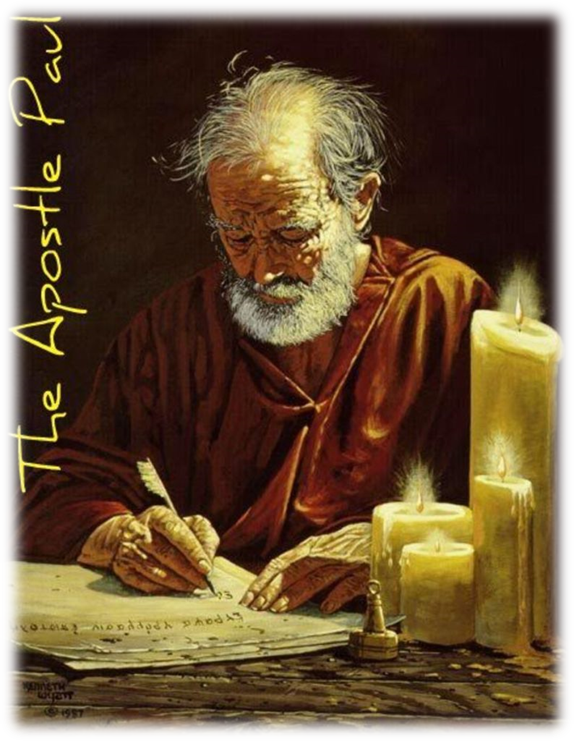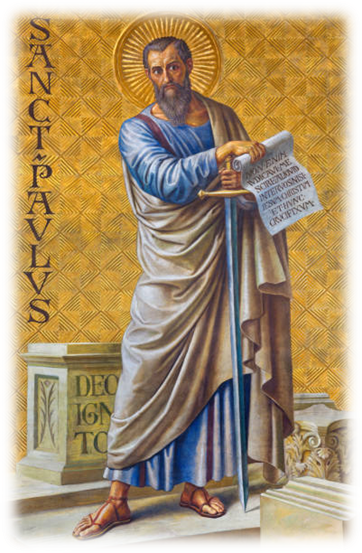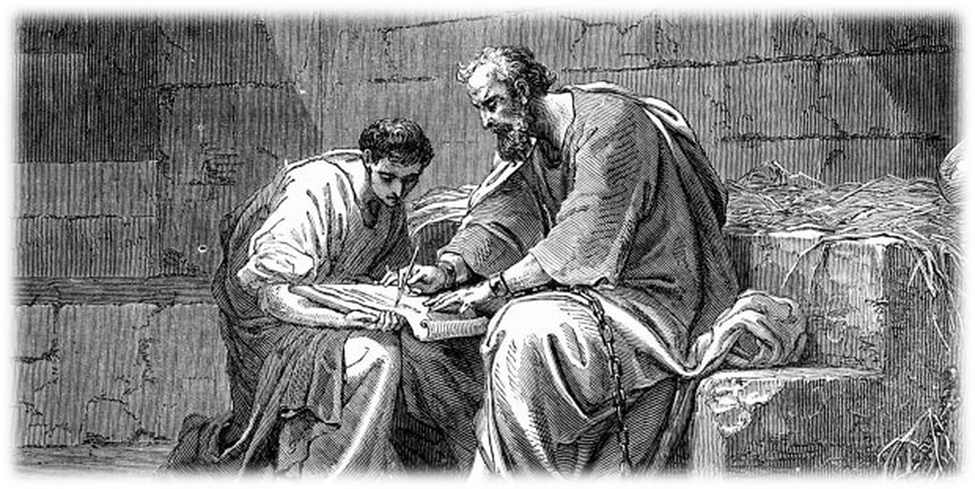“Sunday Sermon”
Paul the Apostle warned that “in the latter times,” there would be a “falling away.” This widespread apostasy would precede the restoration, the “dispensation of the fullness of times,” the “restitution of all things.” (See: 1 Tim. 4:1-3; Eph. 1:10; 2 Thess. 2:1-3; Acts 3:21)
However, Paul had a more pressing and immediate concern. During his ministry, the seeds of apostasy had already been planted and were tearing the Christian apart. Thus, combating false doctrines and apostate groups is a theme throughout Paul’s epistles.

Gal 1: 8-9: curses upon those who teach false doctrine
But though we, or an angel from heaven, preach any other gospel unto you than that which we have preached unto you, let him be accursed.
As we said before, so say I now again, If any man preach any other gospel unto you than that ye have received, let him be accursed.
Ephesians 4:3-6: struggling to keep unity in the church
Endeavoring to keep the unity of the Spirit in the bond of peace. There is one body, and one Spirit, even as ye are called in one hope of your calling;
One Lord, one faith, one baptism,
One God and Father of all, who is above all, and through all, and in you all.
Ephesians 4:11-15: true apostles and prophets promote unity of the faith
And he gave some, apostles; and some, prophets; and some, evangelists; and some, pastors and teachers;
For the perfecting of the saints, for the work of the ministry, for the edifying of the body of Christ:
Till we all come in the unity of the faith, and of the knowledge of the Son of God, unto a perfect man, unto the measure of the stature of the fullness of Christ:
That we henceforth be no more children, tossed to and fro, and carried about with every wind of doctrine, by the sleight of men, and cunning craftiness, whereby they lie in wait to deceive;
But speaking the truth in love, may grow up into him in all things, which is the head, even Christ:

1 Tim 1:3-4: teach no other doctrine, avoid speculation
As I besought thee to abide still at Ephesus, when I went into Macedonia, that thou mightest charge some that they teach no other doctrine, or devote themselves to myths and endless genealogies, which promote speculation rather than the stewardship of God’s work, which is by faith.…
When I left for Macedonia, I urged you to stay there in Ephesus and stop those whose teaching is contrary to the truth. (NLT)
Romans 16:17: identify and shun those who teach false doctrine
Now I beseech you, brethren, mark them which cause divisions and offenses contrary to the doctrine which ye have learned; and avoid them.
And now I make one more appeal, my dear brothers and sisters. Watch out for people who cause divisions and upset people’s faith by teaching things contrary to what you have been taught. Stay away from them. (NLT)
Early Apostate Groups
There were many “Gnostic” groups in the early church teaching false doctrines. These groups claimed to rely on “hidden knowledge,” and the “secret,” “private” teachings of Jesus and His apostles.
Adoptionism: Jesus Was “Adopted” As Son of God Only After Baptism
Adoptionists believed that Jesus was not born the “Son of God.” Instead, He was “adopted” after baptism when God declared, “This is my beloved son.” This “adoption” was confirmed in the resurrection and ascension. Adoptionists pointed out that Paul never wrote about the virgin birth.
Docetism: Jesus Was Pure Spirit; His Physical Body Was an Illusion

Greek philosophy (“Hellenism“) was widespread in the Greco-Roman world at the time of Paul. Plato, and others, taught that everything physical is corrupt, and only spirit is pure. The spiritual is the only true reality.
Hellenism had a huge influence on Judaism and Christianity. For example, this is the origin of the Christian belief that Christ’s, and our, resurrections, are only spiritual, not physical.
Docetists went even further. “Doketai” means “Illusionists,” and they believed that Jesus was pure spirit. Anything that suggested he had a physical body during his lifetime, and after his resurrection, was an illusion. Docetists relied on the “Gospel of Peter.”
Marcionism: The Hebrew God of the Old Testament Was a False God

This sect was based on the teachings of Marcion of Sinope in Rome. They believed that the true God was the benevolent God who sent Jesus, and the angry Hebrew God of the Old Testament was a false god.
(A superficial reading of the Bible has led many to a similar conclusion. For example, Mark Twain referred to the Gods of the Old and New Testaments as the “Jekyll and Hyde of scriptural romance.” However, both Testaments describe a God of love, “hesed” in the Old Testament, and “agape” in the New Testament.)
Marcion focused primarily on the writings of Paul, and believed that Paul was the only true apostle of Jesus.
Ebionites (“super-Judaizers”): Jesus Became a Great “Prophet” By Obeying Law of Moses
Paul resisted the “Judaizers,” those who taught that Gentile Christians must obey the Law of Moses (613 commandments of the Torah, and the 10,000 rules of the Mishnah.) This included circumcision. (At that time, adult circumcision was 50% fatal, due to infections and sepsis.)

The “Judaizer problem” was supposedly resolved at the first great general conference of the church in Jerusalem. (Acts 15: 1-29: Peter, Paul, Barnabas, and James)
However, some “super-Judaizers” persisted. They even started teaching, that not only all Christians must obey the Law of Moses, but it was only by strict obedience to the Law of Moses that Jesus became a “prophet like Moses.” Jesus was not born divine. Jesus did not atone for us. To “come follow me” meant following Jesus’ example of keeping the Law of Moses. We will be judged and saved by our own works of righteousness. (“Works without Faith.”)
“Ebion” signifies “poor.” The Ebionites believed that poverty was a blessing and reward for true righteousness. (Today, some people believe that worldly success is the reward for righteousness.)
Montanism: New Prophetic Revelation and Ordination of Women
Montanus was originally a priest of Apollo. After becoming Christian, he claimed to be a prophet who received ongoing revelation through the Holy Spirit. His two key female disciples, also claimed prophetic revelation.
Their revelations included a strict code of behavior, and the ordination of women bishops. They referred to their sect as the “New Prophecy.”
Avoiding False Doctrine and Apostasy: My Practical Rule of Carpentry
False doctrine and personal apostasy continue to this day. Church members are still “falling away.” We must protect ourselves and our families and friends.
One of the basic rules of carpentry (and geometry) is: 2 points make a straight line.
However, I have made so many boo-boos sawing wood by using 2 points, that I always make 3 points, just to be sure.
Likewise, there are 3 points that make a straight line pointing to Christ. They are: (1) the Scriptures, (2) the Servants of the Lord (living prophets and apostles), and (3) the Spirit. (I call these the 3 S’s: Scriptures, Servants, Spirit)
If one of the three points is out of alignment with the other two, we need to pause and reconsider.
(See: “Ebionites,” “Marcionism,” “Montanism,” “Adoptionism,” “Docetism,” “Christianity in the ante-Nicene period,” Wikipedia.)

(www.londonedition.net)
